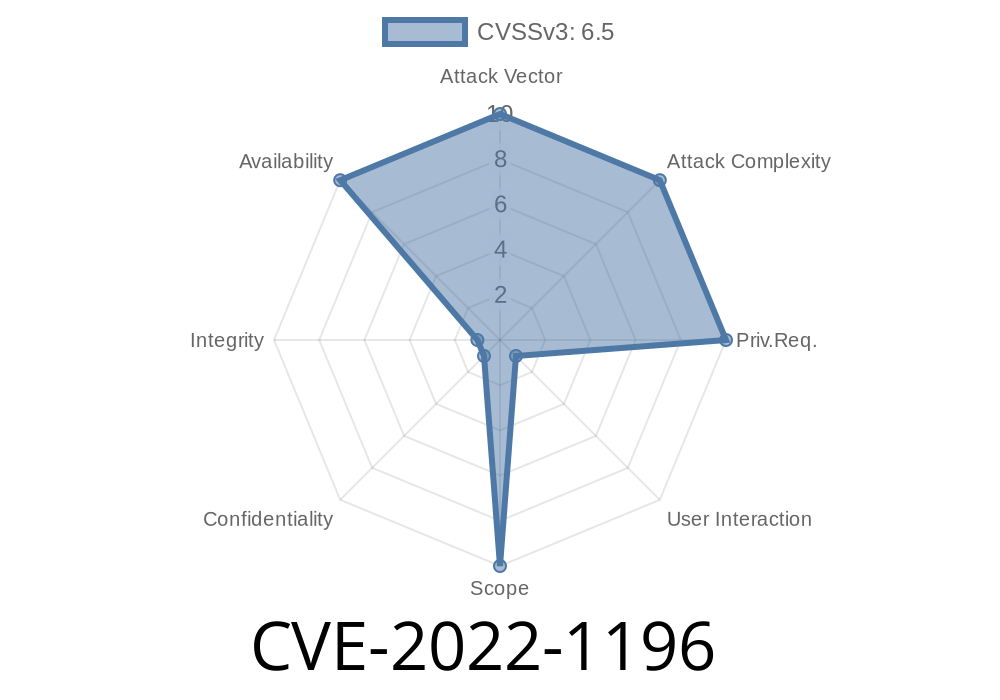CVE-2022-1196 is a security vulnerability that affects *Mozilla Firefox ESR* versions before 91.8 and *Thunderbird* versions before 91.8. It arises from a classic software bug known as the “use-after-free,” which has been the cause of many browser vulnerabilities over the past decade.
In this post, we’ll break down how this bug happens, share code snippets for better understanding, explore exploit details, and link to original advisories. This is original content written simply for developers, bug bounty hunters, and the curious.
What’s the Bug?
When a Virtual Reality (VR) Process is destroyed, some code might keep a reference (pointer) to it and later use it. If another part of the program tries to use this dangling reference, it can crash, or worse—result in code execution by an attacker.
How Does Use-After-Free Happen?
A “use-after-free” bug occurs when a program keeps a reference to something in memory after it has been freed (destroyed). If the reference is later used ("dereferenced"), the results are unpredictable: it might crash, or it might allow an attacker to run their own code.
Simplified Example in C++-style Pseudocode
VRProcess* vr = new VRProcess();
...
delete vr; // The process is destroyed
// Somewhere else...
if (vr->isActive()) { // <--- Use after free! vr now points to invalid memory
// Dangerous actions, possible crash
}
In the real vulnerability, complex inter-process communication and multi-threading were involved, making the bug hard to spot and trigger.
What’s Affected?
- Thunderbird: Versions* before* 91.8 (Release notes)
- Firefox ESR: Versions *before* 91.8 (Release notes)
Standard Firefox is *not* listed as affected, but always double-check your version.
Original Security Advisory
According to Mozilla’s advisory (MFSA 2022-14):
> _“After a VR Process is destroyed, a reference to it may have been retained and used, leading to a use-after-free and potentially exploitable crash.”_
Mozilla rates this as *High* severity because of the risk of exploitation.
How Could This Be Exploited?
A malicious website or email could theoretically trigger the cleanup and destruction of a VR process, then trick the browser into using the invalid reference. This could:
Potentially escape the browser sandbox
The attacker would need to craft precise JavaScript and timing to exploit this. Real-world exploits often use use-after-free bugs to gain control of program flow.
Proof-of-Concept (PoC) Example (Pseudocode)
Here is an illustrative (but not fully weaponized) PoC sketch for educational purposes. *Do not use this code maliciously.*
// Hypothetical: VR API triggers process creation/destruction
let vrDisplay = navigator.getVRDisplays()[];
// Allocate many objects, trigger VR process
startVR();
// Trick browser to clean up VR process
stopVR();
gc(); // Force garbage collection, free related memory
// Later: Use VR object again, possibly leading to use-after-free
vrDisplay.requestPresent([{ source: canvas }]);
*A real-world attack would be more complex, but this sketch shows the basic idea: create, destroy, and then use.*
Patch, Impact, and Mitigation
Mozilla fixed this bug in Firefox ESR 91.8 and Thunderbird 91.8.
References
- Mozilla Security Advisory for Thunderbird MFSA-2022-14
- Mozilla Security Advisory for Firefox ESR MFSA-2022-13
- CVE-2022-1196 at NIST
- Mozilla Bugzilla: Bug 1763645
Final Words
Use-after-free bugs are serious and keep appearing in large, complex software like browsers. They often allow attackers to crash apps—or worse.
If you use or manage *Thunderbird* or *Firefox ESR*, make sure to update soon. Stay safe, read security advisories, and review your dependencies often.
If you're curious or researching browser bugs, check out related vulnerabilities and follow responsible disclosure guidelines.
Timeline
Published on: 12/22/2022 20:15:00 UTC
Last modified on: 12/29/2022 20:31:00 UTC
